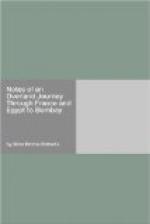The chateau has been purchased by an English banker, but is now uninhabited: there was a report of its being about to be pulled down. It is a large, heavy building, not distinguished by any architectural beauty, yet having an imposing air, from its extent and solidity. It is surrounded by fine woods and pleasure-grounds, laid out in the formal style, which is still the characteristic of French landscape-gardening. Nothing can be more beautiful than the surrounding scenery, the winding river with its vineyards hanging in terraces from the opposite heights, the village reposing beneath sun-lit hills, while corn-fields, pasture-land, and cattle grazing, convey the most pleasing ideas of the comfort of those who dwell upon this luxuriant soil.
The city of Mantes now appeared in the distance, and as we approached it, our guides pointed out, on the opposite heights of Gassicourt, a hermitage and Calvary, which had formerly proved a great source of profit. An ascetic, of great pretensions to sanctity, took up his abode many years ago in this retreat, carrying on a thriving trade, every boat that passed contributing twopence, for which consideration the hermit rung a bell, to announce their arrival at the bridge of Mantes, giving notice to the town, in order to facilitate the transfer of baggage or passengers. This tax or tribute the hermit was not himself at the trouble of collecting, it being scrupulously despatched to him by the donors, who would have deemed it sinful to deprive the holy man of what they considered his just due.
The sort of piety, which once supported so great a multitude of religious mendicants, is greatly on the decline in France. A few crosses on the bridges and heights, and the dresses of the priesthood whom we encountered in the streets, were the only exterior signs of Roman Catholicism which we had yet seen. Our boatmen spoke with great respect of the Sisters of Charity, pointing out a convent which they inhabited, and told us that during illness they had themselves been greatly indebted to the care and attention of these benevolent women.
It was now growing dark, and we very narrowly escaped a serious accident in passing the bridge of Meulan, the boat coming into contact with one of the piers; fortunately, the danger was espied in time. There was now not the slightest chance of reaching Paris before the following morning; but we regretted nothing except the want of light, the gathering clouds rendering it impossible to see any thing of the scenery, which, we were told, increased in beauty at every mile. We consoled ourselves, however, with tea and whist in the cabin; in fact, we played with great perseverance throughout the whole of our journey, the spirits of the party never flagging for a single instant.
We found a good hotel at the landing-place, at which we arrived at a very late hour, and starting the next morning by the early train to Paris, passed by the rail-road through an extremely interesting country, leaving St. Germain-en-Laye behind, and tracking the windings of the Seine, now too shallow to admit of the navigation of boats of any burthen.




